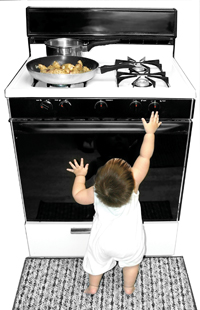 Ask yourself: Do I put my child in danger by some of the choices I make when I am distracted?
Ask yourself: Do I put my child in danger by some of the choices I make when I am distracted?
Research says that most likely you do! Do you drive while talking on the phone without a hands-free device? (More than 40 percent of parents do.) Do you turn your back on your child at the park to talk with friends or read magazines? (More than 60 percent of parents do.) Are you among the 33 percent of parents who leave a child younger than 5 in the bathtub unsupervised? Are you distracted by work, errands, time pressures or the number of commitments you have in a day?
If so, you are not alone.
A recent BabyCenter community posting asked the question: “Can I leave my baby unattended in a Jumparoo [activity jumper]?” Many of the respondents said “yes,” even if it meant leaving the house to get mail or take out the trash. Researchers say that more than 80 percent of parents and caregivers report knowingly leaving their child in a compromised situation while they are distracted with trying to multitask.
Accidents happen
For most parents, the decision to leave a child unattended is not intentional; it just happens as a result of trying to manage the events of the day. But, despite a parent’s best efforts, accidents happen every day. According to the National Center for Injury Prevention, unintentional injuries are the most significant health challenge for children between the ages of 1 and 19 years, with home injuries a major proportion of the problem.
In the United States, there were more than 8 million nonfatal unintentional injuries to children in 2005, according to the American Public Health Association. Of these, more than 90 percent are estimated to be a result of avoidable accidents.
Consider the following example: Lily was 9 months old when her mom, LeAnne, was distracted and forgot her at the gymnastics studio. Dance class had ended for Lily’s sister and after helping her 5-year-old put on her coat and shoes, LeAnne took Lily’s sister out to the car and drove away. After about 15 minutes, LeAnne frantically arrived back at the studio with tears streaming down her face. She was embarrassed but relieved to find two other moms playing with Lily and keeping her safe. LeAnne just kept repeating, “I can’t believe I did that. I’m so sorry, Lily.”
When reflecting on the incident, LeAnne says, “I try to live in the moment, but so often I am 10 steps ahead of myself.”
As parents, our number one responsibility is protecting our children and keeping them safe. How can we possibly do this if we’re reading email while giving our child a bath or talking with friends while our child wanders off?
Slow it down
The reality is that most parents exist in a state of hurry up, go faster and do it all. This increasing pace of life causes parents to become distracted and forget what is important right now — and what can wait. It seems somewhat amazing that most children make it through the day unharmed if their parents (including this writer!) are overwhelmed by the number of tasks that need to be accomplished.
Somehow, we remember to drop our kids off and pick them up (mostly) on time. We remember their favorite blanket, their lunchboxes, their homework and their sports schedules. We manage to get to work, take care of medical appointments, get to the grocery store and pay our bills.
Parenting experts suggest that children need room to explore their world and be adventurous. However, they should not be left to do this alone. Parents need to be fully present, and give age-appropriate freedoms.
 Nadia was 4 when she fell from the fire pole at the park. Her dad, Jens, was seated on a bench nearby. “It all started with a phone call,” Jens says. “I saw that the number was from my work so I answered the call. I lost track of time and got distracted. When I heard the scream, I looked up, but it was too late. Nadia was on the ground.” Although Nadia was shaken up and suffered some scrapes, she was not seriously hurt.
Nadia was 4 when she fell from the fire pole at the park. Her dad, Jens, was seated on a bench nearby. “It all started with a phone call,” Jens says. “I saw that the number was from my work so I answered the call. I lost track of time and got distracted. When I heard the scream, I looked up, but it was too late. Nadia was on the ground.” Although Nadia was shaken up and suffered some scrapes, she was not seriously hurt.
Jens says the fall changed his perspective. “I realize how lucky I was. Sometimes, making the decision to be distracted is dangerous for the here and now.”
For many parents, multitasking seems like the only way to cope with life. But parenting experts suggest a different approach: Slow down and be present. Consider what could happen and choose a different outcome by eliminating distractions and using focused attention. While this may seem difficult to do, it is necessary to keep our children safe.
B. Alan Wallace, author of The Attention Revolution, cites studies of brain receptivity when a person is doing more than one task at a time. The research shows that distracted multitasking can cause stress, forgetfulness and poor decision making. Wallace says, “From moment to moment, there is really no such thing as mental multitasking. At any given moment, our minds are on one thing only.”
Research also shows that parents often underestimate to the extreme the amount of the time they leave a child alone. What seems like five minutes is really 20 minutes. Every day, children encounter a number of potential hazards. While it may be impossible to eliminate all dangers, parents and caregivers can take steps to reduce the risk of unintentional injury. Slow down and think about consequences. Perhaps you consider yourself to be good at multitasking. You may be. But ask yourself, “At what cost?” If you think about your behavior, have you just been lucky? Is your mind preoccupied with future tasks rather than the here and now? When you do multiple tasks simultaneously, your brain becomes distracted and cannot give each task equal attention. As a result, something has to give . . . don’t let it be your child’s safety.
Carolyn Pirak is a mother and the executive director of the Bringing Baby Home program.
Do you put your child at risk?
10 scenarios to consider:
1. Do you check around your vehicle prior to moving it?
2. Do you make sure your children are buckled in before driving?
3. Do you knowingly leave young children unattended?
4. Do you leave food cooking on the stove and walk away?
5. Do you make sure you know where your kids are both at home and in public places?
6. Do you assume other people are watching your children?
7. Do you feel as though accidents won’t happen to your kids?
8. Do you leave your kids in the house or car alone, even for a few minutes?
9. Do you let young kids play in your driveway or on your street without supervision?
10. Do you trust your young child to know what is safe?









